ROUNDTABLE / TURKEY
At a recent roundtable in Istanbul, Global Finance brought together a group of leading figures in the Turkish banking industry to discuss the key issues facing this rapidly developing and growing economy.
GLOBAL FINANCE:
Does geopolitical shock potentially pose the greatest threat to Turkeys economy, particularly coming from neighboring Iraq? What are your views on what could happen in Iraq or elsewhere, and how would that affect Turkey?
DURMUS YILMAZ
, governor, Central Bank of Turkey: The Turkish economy faces geopolitical risks, financial market risks, political risks, as well as market and interest rate risks. These risks will impact the economy in different ways. Of course, Turkey is in a geographical area where there have been ups and downs, and the economy is certainly affected by, say, the conflict in Iraq or the relationship between Iran and the United States. Whatever developments may occur, though, the basic fundamentals of the economy as compared to the pre-2001 period are stronger, and therefore, as central bank, we are confident we can ride through any adverse developments in the region.
ASAF SAVAS AKAT
, columnist and economist, Vatan newspaper: The risks can change. If you throw away a cigarette into a forest, it may cause a fire, but if you throw even a Molotov cocktail into a forest where it rained for the last six months, you will not be able to start a fire. In 2001 a little dispute between the prime minister of the day and our current president caused a major financial crisis. Three years later a major war in Turkeys neighbor, Iraq, has not impaired the Turkish economy. With the two strong anchors of the International Monetary Fund and the European Union, Turkey has seen a remarkable transformation of its economy. We have relatively low inflation, high growth, better regulation, a successful privatization program, a more stable banking sector. The structure of the Turkish economy overall is much less vulnerable today to geopolitical or market risk than it was, say, four years ago.
ERGUN OZEN
, general manager, Garanti Bank: The Turkish economy and banking sector are now much more resilient to external shocks thanks to the structural reforms made in the recent past. The increasing risk awareness of the investors toward the region will most probably cause volatilities in money and capital markets in Turkey if there are negative developments in the neighboring countries, but the volatilities will not easily turn into a major crisis in the banking sector or in the economy as happened in the past. On the other hand, we should keep in mind that there is significant trade volume between Turkey and its neighbors, such as Iraq. Although the instabilities in Iraq negatively affected the trade volume, it is still crucial for some companies and the economies of some cities in the southeastern part of Turkey. If the trade volume declines due to geopolitical risks, the companies that are either operating in those cities or have strong trade volumes with neighboring countries may fail to meet their financial obligations. In that case we may see an increase in the non-performing loans [NPL] levels, as happened during the Iran-Iraq war.
SERVET YILDIRIM
, editor-in-chief, CNBC-e: The key question is what could happen in Iraq and how would that impact Turkey. One major question mark for Turkey is whether an independent Kurdistan will be created or not. I think for the near future it is not likely. No player in the regionSyria, Iran and Israel and even other Arab stateswould benefit from the establishment of an independent Kurdish state. The status quo will be maintained in Iraq. That means Turkey will continue to have an Iraq problem in the short and medium term as a major risk factor. But the Turkish economy has learned the ways of coping with the Iraqi problem that emerged 17 years ago.
MURAT ULUG
, chief financial officer, Turkish airports operator TAV: Since we began operating Istanbul International Airport in the year 2000, there have been many crises around the world9/11, the 2001 Turkish economic crisis, global economic crises, avian flu, terrorist attacks and so on. In this six-year period, passenger numbers have grown an average of 11.2% per yearmore than double the European averageso while there are some major risks, if you know how to mitigate those risks, the recovery from those sudden events will be much quicker. Given that 60% or 70% of the passengers are businesspeople, those figures demonstrate the strength of the economic recovery.
CIHAT TAKUNYACI
, deputy representative of The Bank of New York: In order to maintain political and economic stability, the Turkish government needs to work with supportive countries from the EU and its neighbors to protect its interests. The governments economic management looks like it has the capacity and experience to manage such delicate times with minimum damage.
YILMAZ
: It is not within the central banks domain to make a political analysis of the situation, but if events take place that might impact the economy, we have to have the instruments available to counteract those developments. The central bank has experience in this field, and it has ample means to respond to developments.
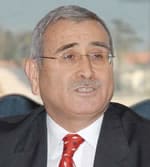
|
|
|
AKAT
: One of the remarkable things about Turkey is how fast it has rebounded from economic shocks. Many adverse shocks happen, and Turkey seems to recover quite fast.
GF
: Last year was a great year for Turkish banksparticularly for corporate banking. What accounted for these results, and how do you expect the sector to perform in 2007?
YILMAZ
: The past five years experience compared to the previous 30 years has proved that the key for economic development is economic stability as well as political stability. If these two things go hand in hand, it is beneficial for every sector of the economy. Economic stability means price stability, and price stability means growth.
TOLGA EGEMEN
, assistant general manager, Garanti Bank: It was a great year across the whole industry. Consumer banking is growing very fast, in line with the reduction in the local interest rates. But when you focus on corporate banking, 2006 was an exceptional year, partly due to the fact that we have had several major privatizations. These one-time, big transactions required financing from the banking sector, which has helped grow the banks balance sheets. There are also private equity funds moving into Turkey, acquiring even medium-size companies, which is providing more business for the banks. Thanks to the low cost of funds here, the Turkish banks have been able to play a key roleeven a lead rolein all the financings of these transactions. Another change is that, in the past, international banks were lending to the Turkish banks, and Turkish banks were lending to the Turkish local companies. Now, thanks to the improvement in the economy, these foreign banks are lending directly to the Turkish businesses.
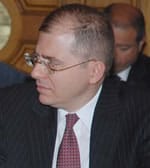
|
|
|
TAKUNYACI
: Results were very attractive but include some deficiencies as well. Due to the fierce competition from local and international players, some credit risks were priced too cheaply. This is a very dangerous approach as it prevents the banking industry from having a quality balance sheet. Additionally, the Basel II requirements will not be fulfilled. A failure will definitely create weakness during times of global liquidity drains. Additionally, the high intermediation costs in the Turkish banking system prompts the booking of some assets outside Turkey with the help of international foreign banks. This can be treated as a negative aspect in terms of competition as well as from a risk-management perspective.
AKAT
: I wonder how well prepared Turkish banks will be for any future slowdown. Given that slowdowns often lead to non-performing loans, while Turkish balance sheets are much healthier today, I think the risk is there.
OZEN
: Loan growth in Turkey has been remarkable in the past five years. This trend will continue because the loan penetration is still very low compared to developed countries. Housing loans, for example, have significant potential and will be the main growth area, especially after the introduction of the mortgage system in the first quarter of this year. The housing loan penetration in EU is around 50%, more than 10 times higher than the figure in Turkey. There is a common concern about the foreign currency mismatch in the corporate sectorthat companies may have high foreign currency liabilities. We believe they have significant assets abroad covering their FX liabilities in Turkey, so this problem may be moot. Also, most of the FX borrowing customers are corporates that generate significant FX revenues or have easy access to FX sources.

|
|
|
YILDIRIM
: If any areas of Turkish banking are not up to scratch, we should change them because there are many newcomers into the Turkish banking sector that can borrow at low rates in international markets, so this is challenging for some other banks in Turkey.
YILMAZ
: We have found there has been an improvement relating to foreign exchange borrowing in the sense that usually the large corporations that have foreign exchange earnings borrow in foreign currencies, but some smaller companies that do not earn any foreign exchange are borrowing in foreign currencies. This is to be watched out for.
GF
: This is an election year in Turkey. How, if at all, will this affect the central banks policies, and how might it affect the economy and investment?
YILMAZ
: We are not in a position to try to influence political developments by interest rate policy, but if political developments impact economic variables, then it is our responsibility to use our policy tools to contain that impact. We will have two elections this yearpresidential and parliamentary. Until two months ago there was more talk about the impact of the political risk on the economy, but that risk has somewhat abated so, hopefully, we wont have to do anything to respond.
TAKUNYACI
: As long as the IMF and EU anchors are held tightly during the election period, the elections will have little impact on the economy.
AKAT
: I dont see the election having an impact on the Turkish economy at all. If something goes wrong with the Turkish economy, the elections could be an excuse for the financial markets, but the elections would not be the cause of it.
ULUG
: We had meetings and conference calls with 113 international investors in February, and none of them asked about the elections. They only asked about the operations of the companynot even the economics of the country. These are long-term investors, and I dont believe they are worried at all.
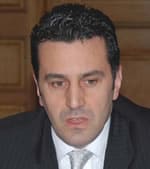
|
|
|
OZEN
: There are some risksespecially on the expenditure sideif economic indicators get distorted due to this being an election year. Tight fiscal policies need to be maintained. We cannot afford for the government to increase expenditure due to the elections.
YILDIRIM
: The communication skills of the central bank are critical at this stage, especially in an election year. So far, the central bank has been really successful in giving clear messages to the markets.
YILMAZ
: As a monetary policy authority, what is important for us is to watch developments. If there are any deviations from the usual practices, I think we have to share this with the public and inform the public. There have been great improvements in the management of public finances, especially at the central government, but there are some local government finances that are not as well managed. These are the areas where there are spending risks. We have been sharing this concern with the public at large.
GF
: Is EU accession still critical to the Turkish economys future success?
AKAT
: Is it critical to the economy? No, but if Turkey loses the prospect of EU membership, many peopleincluding myselfthink that this country may be more prone to the kind of political adventures that would have very negative effects on the Turkish economy. So its of indirect importance.
EGEMEN
: What is critical is what we do to become a member in terms of making our legal and economic infrastructure, human rights and other areas fully compatible. Successive Turkish governments have been very successful in being committed to doing the reforms required for EU membership. Whether or not we become a full member is not that critical.
AKAT
: Whether Turkey will join the EU has very little to do with Turkey and a lot to do with Europe.
YILMAZ
: In the meantime, we have to do what is necessary to join: We have to carry out our job.

|
|
|
TAKUNYACI
: The EU accession process is critical for Turkey because it will help the countrys development, both socially and economically. If the rules and regulations of EU can be established in Turkey, this will be a great achievement whether or not we achieve full EU membership. The process should be treated as a tool and not a target.
GF
: In recent years Turkeys banks have been a favorite acquisition target for foreign banks. Can we expect still more purchases by foreign banks?
ULUG
: Its not only the foreign banks; its the real sector as well. But it was the banks that first drew the interest of foreign investors, not because of economics but because of their corporate structure. Now companies are improving their corporate structures, too, so the real sector is getting the attention of foreign investors.
OZEN
: The Turkish banking sector has low penetration ratios and offers very attractive prospects for foreign banks. Foreign banks interest in the Turkish banking system will continue to grow, given Turkeys young and large population and the sectors high growth potential. Other advantages are the sectors human resource capacity, technological infrastructure, experience and local knowledgeand the fact that it is highly regulated.
EGEMEN
: One key thing about the Turkish market is that even where banks are majority owned by foreign banks, they have still kept their local, Turkish management. That was a very important factor in maintaining the existing level of service and understanding of Turkish companies.
YILDIRIM
: In terms of whether we can expect still more purchases by foreign banks, we know that there is a limited number of banks now available for sale. So we know the upper limit. I wonder what the banking watchdog will do. Will it give licenses to new applications or not? We might see some new foreigners in the field of investment banking.
OZEN
: I think five banks will account for 75% to 80% of the banking-sector assets in the coming three to four years.
TAKUNYACI
: Turkish commercial banks were sold out with incredibly high multiples that may cause a slowdown in additional sales. In the meantime we may see appetite from international investment banks and Islamic banks to establish operations here either through acquisitions or new startups, provided that some enhancements are introduced into the Turkish capital markets law. These two types of banking services will also help the Turkish banking system to reach a sustainable structure in the long run.
GF
: The receptivity of global capital markets to offerings from Turkeys banks and corporates is important for the country. How do you expect offerings from Turkey will be received in 2007? An efficient local capital market is also important, and some have observed that Turkeys is weak. Do you agree, and, if so, what can be done to strengthen it?
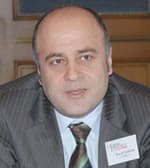
|
|
|
ULUG
: I dont agree. Our offering was 18 times oversubscribed for the international offering and 10 times for the domestic offering. However, for the coming year there may be a perception of risks coming from the elections, which might be the reason there arent any applications for IPOs being made yet. If the story is good and the fundamentals are good, any offerings in the capital markets will be welcomed.
TAKUNYACI
: Up to now the appetite for Turkish assets has been very high. We may see a slowdown until presidential elections. Selection of a president approved by wider segments of the society will again increase receptivity and appetite until general elections in November. FDI and capital markets will be other key areas for Turkeys progress from emerging market to developed market. If Turkey can set up capital market practices that are well integrated with the global system, this will not only help to increase FDI flow into Turkey but also speed up the sharing of growth and wealth between all layers of society.
EGEMEN
: The loan markets have been extremely receptive to Turkish banks and corporates. In 2002, after the crisis, the total amount of loans made available to Turkish banks or corporates from the international market was $2 billion. In 2006 it was $13 billion. This year might be relatively lower, especially in the loan markets. Thats because most of the banks chose to do two- or three-year expirations last year and the year before last, which means this year nothing is expired.
YILMAZ
: Political stability and price stability are helping to create the right conditions for these transactions to take place; businesspeople are confident about what will happen in the future. But we also need to grow our financial sector. At the moment its size is smaller than Turkeys GDP, and in developed countries it is three or four times higher than GDP. In order to have healthy capital markets, we have to have a large financial marketthree to four times the GDP. We have not yet achieved price stability, where inflation would not play a role in a companys decisions, but we are driving toward that, and that will help create the conditions where the financial sector can grow.
YILDIRIM
: A miracle is taking place in the business climate, but we should look at the global environment. If the global environment and liquidity conditions continue to be favorable, offerings from Turkey will be well received this year. We have to make sure Turkey has strengths compared to other countries.
GF
: Some have observed that foreign investors have a much more positive view of Turkey than do domestic investors. If this is true, what dangers does it pose for Turkey?
TAKUNYACI
: Foreigners are more committed than ever to Turkey, and unlike Turkish investors they take a long-term view in their investment decisions. This wont pose any danger; in fact, its favorable for Turkey at this stage.
OZEN
: Everybody is looking at the same risk measurements, whether theyre local or foreign. Foreign investors are more liquid, though, and mostly are looking at the big picture with a long-term view. They are not so worried about small details or short-term negative expectations, which probably makes them more positive.
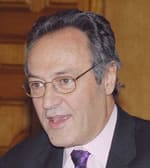
|
|
Akat: Whether Turkey will join the EU has very little to do with Turkey and a lot to do with Europe. |
: The risk is the same, but the risk assessments are not the same. Foreign investors attitude to long-term risk may be different from domestic investors.
YILMAZ
: There has been some increase in foreign currency deposits at the banks, but we have to be aware that not all of this means changing portfolio preferences. We have to discount from this mergers and acquisitions money that has come from individuals into the country.
YILDIRIM
: Foreigners and locals have different aims: Turks are investing in foreign currency, while foreigners are investing in Turkish businesses.
YILMAZ
: On the bond market, for example, foreign investors are more active than the domestic ones. If this is because the locals risk perception is different, then we have to ask why. Is it the political risk? Is it because the historical build up in the culture of the domestics results in a perception of risk quite different from that of the foreigners, who don’t know the dynamics inside the country?
AKAT
: Our risk perceptions have moved in different ways in the past. Foreigners have proven to be right in the past, and Turks have proven to be wrong. But what if the Turks are right this time, and foreigners are wrong about the risk assessment of Turkey?
YILDIRIM
: For foreigners Turkey is just one instrument in their basket, but for many locals Turkey is the only one, so their risk perception is very different.
OZEN
: Yes, Turks are taking more local risk as a proportion of their investments.
GF
: We have seen recent rate hikes in Japan and Europe. What impact does this have on emerging markets and Turkey?
YILMAZ
: This is one of the risks we have been warning the market about. The interest rate hikes in the developed economies might prompt investors to leave the emerging markets. A slowdown in the US shouldnt affect us too much, but if there is a sentiment change toward emerging markets, it could have an effect.
AKAT
: I think its a much bigger riskperhaps the biggest threat in the short to medium term. We talked about the asymmetrical risk perception of locals and foreignersyou can more or less count on it that this will have some effect, and if it affects liquidity, that will affect the market.
OZEN
: Even though the gradual rate increase was expected, it might cause foreign investors to reduce investments in the emerging markets, which might cause some volatility.
TAKUNYACI
: Keeping real interest rates high is the best weapon to defeat the destructive effects of hot money draining from emerging markets during such periods. The short-term effects of such interest rate hikes could be minimal given the prospects Turkey has. A good flow of FDI and deeper capital market activities will eventually pull back the real interest rates again in Turkey.
YILMAZ
: In conclusion, for economic welfare, the key is this stability. Stability emanates from two things. One is political stability. The other is economic stability, which basically means price stability. These are things that society should not underestimate. If we are going to find jobs for all our people, we have to invest. In order to invest, our businesspeople must be able to see their future, so we have to eliminate the inflation risk. The Central Bank of Turkey will do what it can do to achieve this target so that we will clear the way for our businesspeople.
Joseph Giarraputo
ULUG



